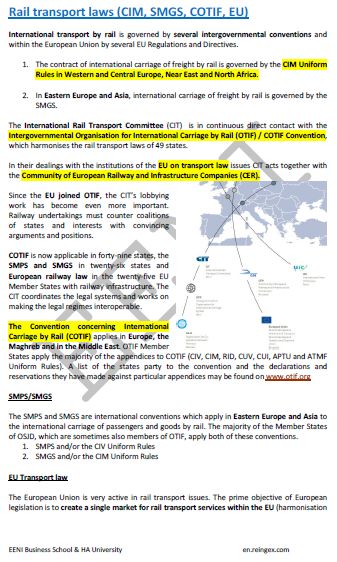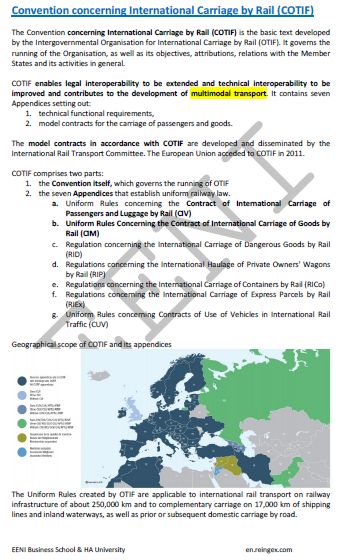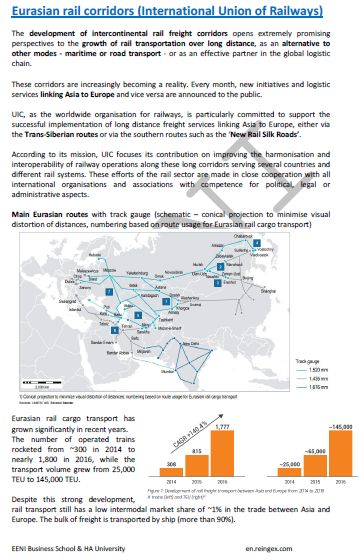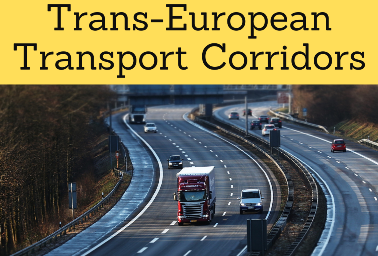Rail Transport Law, CIM SMGS COTIF
International Rail Transport Committee, CIM Consignment Note, COTIF

The International Rail Transport Committee helps the railways to implement International Rail Transport Laws.
In the recent decades, the political, economic, technical and legal evolution has required that the activities of international rail Transport Committee (CIT) be further diversified, culminating with the most important reform ever undertaken in international railway law: to make the COTIF Convention is compatible with the Directive 91/440 / CEE on the development of railways of the European Union.
- Introduction to International Rail Transport Committee (CIT)
- International Rail Transport Law (CIM, SMGS, COTIF, EU Transport Law)
- Uniform Rules concerning the Contract of International Carriage of Goods by Rail (CIM)
- CIM/SMGS Consignment Note
- Electronic CIM/SMGS Consignment Note
Sample - International Rail Transport Law:


The Subject “International Rail Transport Law (CIM, SMGS, COTIF). International Rail Transport Committee (CIT)” is included within the curriculum of the following academic programs at EENI Global Business School:
Courses: Rail transport, Multimodal Transport, Transport and Logistics in Africa.
Certificate in International Transport

Masters: International Transport, Transport and Logistics in Africa.


Languages: 
 Droit international du transport ferroviaire (Summary in
Droit international du transport ferroviaire (Summary in  Derecho internacional del transporte ferroviario
Derecho internacional del transporte ferroviario
 Direito internacional do transporte ferroviário).
Direito internacional do transporte ferroviário).

The International Rail Transport Committee (CIT) is an association of 216 railway and shipping enterprises that provide services to international passenger and cargo enterprises.

International rail transport is governed by several intergovernmental agreements and within the EU by several EU regulations and directives.
- The contract for international carriage of goods by rail is governed by the Uniform Rules concerning the Contract of International Carriage of Goods by Rail (CIM) in Western and Central Europe, the Middle East and North Africa
- In Eastern Europe and Asia, international carriage of goods by rail is governed by the Agreement on international carriage of goods by rail (SMGS) of the Organization for Cooperation between Railways (OSJD)
The COTIF Convention is applicable in forty-nine states, the SMPS and the Agreement on international carriage of goods by rail (SMGS) in twenty-six states and the European railway law in the twenty-five EU member states with rail infrastructure.
The International Rail Transport Committee (CIT) is in continuous direct contact with the Intergovernmental Organization for International Carriage by Rail (OTIF) / Convention COTIF, which harmonises rail transport laws of 49 states.
In its relations with the EU institutions on transport legislation, the International Railway Transport Committee acts jointly with the Community of European Railways and Infrastructure enterprises (CER).
The CIT Cargo Traffic Manual (GTM-CIT) specifies the standard way in which international transport of goods by rail must be carried out in order to guarantee t integrity of transport contract.
Member countries of international rail Transport Committee: Albania, Algeria, Armenia, Austria, Azerbaijan, Belgium, Bosnia and Herzegovina, Bulgaria, Croatia, Czech Republic, Denmark, Estonia, Finland, France, Germany, Georgia, Greece, Netherlands, Hungary, Iran, Iraq, Ireland, Italy, Jordan, Lebanon, Latvia, Liechtenstein, Lithuania, Luxembourg, Macedonia, Morocco, Monaco, Montenegro, Norway, Pakistan, Poland, Portugal, Romania, Russia, Serbia, Slovakia, Slovenia, Spain, Syria, Sweden, Switzerland, Tunisia, Turkey, UK, Ukraine.
Headquarters of international rail Transport Committee (CIT): Bern (Switzerland).


- Containers and Transportation
- Rail Transport in Africa
- Customs Convention on Containers
- Road-Rail Combined Transport
- Almaty-Bishkek Logistics Corridor
- Bangladesh-Myanmar Logistics Corridor
- China-Russia Logistics Corridor
- China-Pakistan Logistics Corridor
- China-Central-West Asia Logistics Corridor
- India-Afghanistan Logistics Corridor
- Europe-Caucasus-Asia Logistics Corridor
- Corridor of the Ashgabat Agreement
- Trans-Siberian Railway (Russia, North Korea)
- North-South Corridor (India-Russia)
- Afghanistan-Turkey Logistics Corridor
- Trans-Caspian Logistics Corridor
- East-West Corridor (Myanmar-Vietnam)
- Kyrgyzstan-Iran Logistics Corridor
- Islamabad-Istanbul Logistics Corridor
- Nanning-Singapore Logistics Corridor

(c) EENI Global Business School (1995-2025)
Top of this page









 WhatsApp
WhatsApp